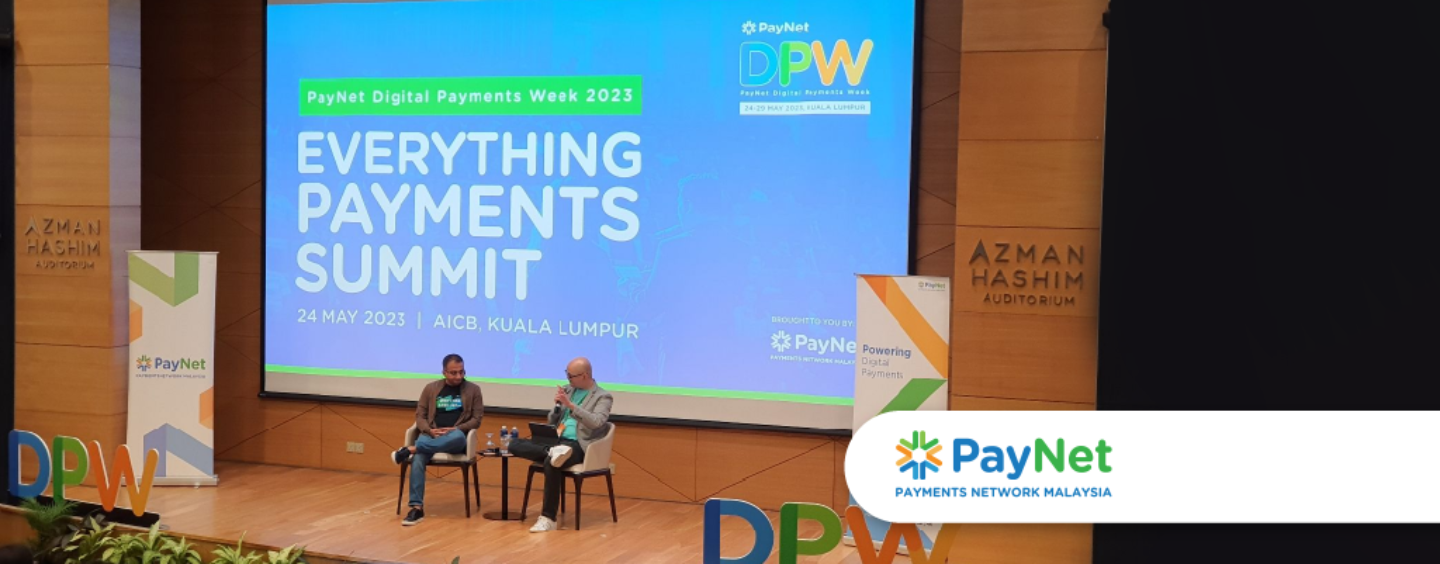/ What’s PayNet’s Vision for Malaysia’s Digital Payments?
What’s PayNet’s Vision for Malaysia’s Digital Payments?

Malaysia, 29 Mei 2023 - During a fireside chat at the ‘Everything Payments Summit‘ of the PayNet Digital Payments Week moderated by Vincent Fong, Chief Editor of Fintech News Malaysia, Farhan Ahmad, Group CEO of PayNet, discussed the future of digital payments in the country.
Drawing from his experience in start-ups and expertise in the payments industry, Farhan shared valuable insights on his experience in growing four start-ups and the future direction of PayNet.
He emphasized PayNet’s role in shaping and influencing Malaysia’s digital payments landscape, focusing on driving innovation and fostering the growth of the start-up and fintech ecosystem in this country.
From Startup to PayNet
As an experienced entrepreneur with 25 years of experience, Farhan Ahmad said he joined PayNet because he admired the company’s ambitious mission and vibrant company culture.
Recognizing the potential of digital payments to contribute to the greater good, he saw an opportunity to leverage his entrepreneurial experience and make a meaningful impact in the industry.
Drawing from his startup journey, Farhan highlighted the crucial timing and comprehensive planning elements. He recognized that while navigating good times may be relatively straightforward, challenging periods demand resilience and well-prepared strategies.
Farhan firmly believed in taking control of one’s destiny and emphasized the importance of contingency plans to overcome unforeseen obstacles.
One crucial lesson that Farhan carried from his startup experience was the value of succinctly communicating a value proposition. He emphasized the need for a clear and concise message that instantly conveys the value of a product or service.
“If it takes too long to explain the value, it is a sign that it may not be compelling enough,” he said. This lesson applied not only to startups but also to established organizations such as PayNet.
Perfecting the 20% in the 80/20 Rule
Farhan underscored the significance of directing attention towards the vital 20 percent, which encompasses the core activities, strategies, or initiatives that wield the most profound influence on organizational success.
Drawing inspiration from the Pareto Principle, which reveals that 20 percent of inputs yield 80 percent of outcomes, this concept advocates for organizations, including startups, to optimize their resources and efforts strategically.
Key points about the crucial 20 percent include identifying the core value proposition to differentiate from competitors and enhance value for the target audience.
“Success lies in prioritization and resource allocation, recognizing that not all tasks are created equal. By focusing resources on the most impactful activities and minimizing efforts on less critical tasks, organizations can unlock their true potential and maximize their effectiveness.,” said Farhan
Adopting a narrow focus is recommended over spreading resources thin across various initiatives. Organizations can deliver exceptional value and achieve remarkable results by dedicating efforts to a few key areas and striving for excellence.
Continual evaluation and refinement are crucial, as the essential 20 percent is not static. It requires an ongoing assessment based on market dynamics, customer needs, and organizational goals.
Regularly reassessing and adjusting the focus allows organizations to stay aligned with strategic objectives and maintain a competitive edge.
“By recognizing the significance of the crucial 20 percent, organizations have the power to optimize their operations, enhance efficiency, and significantly enhance their chances of attaining desired outcomes,” said
The Long-Term Vision for PayNet
When discussing the long-term vision for PayNet and his “20 percent”, Farhan outlined a cohesive three-tier strategy that PayNet has developed, which will be implemented over a five-year period.
“In the first tier, our priority is to strengthen the foundation of PayNet by internalizing the payment system, optimizing costs, and ensuring its reliability and stability,” explained Farhan.
Transitioning to the second tier of initiatives, the focus shifts towards strengthening core capabilities, enhancing user experiences, and implementing open data initiatives that contribute to the usability of the payment system.
Lastly, the third tier aims to provide value-added services, address fraud and risk management concerns, and foster partnerships between fintech companies and traditional banks. Farhan emphasized the significance of nurturing an ecosystem where banks and fintechs collaborate, bringing innovative products and services to the market.
By implementing this three-tier strategy, PayNet strives to position itself as a leading force in the digital payment industry, providing secure and efficient solutions while fostering collaboration and innovation.
Making PayNet Accessible for Startups
During the discussion, the issue of significant costs associated with participating in PayNet’s payment ecosystem was brought up, prompted by concerns among the fintech attendees.
Addressing these concerns, Farhan, acknowledging the importance of affordability and supporting the growth of startups, stressed the need for reasonable and rationalized pricing to foster innovations. He explained that if innovative and value-adding products and services are offered at no fees or charges, there is no incentive to innovate.
He highlighted his desire for fintechs, traditional banks, regulators, and PayNet to work together towards this goal.
He explained for any domestic payment schemes/infrastructure; the main motivations should be technology sovereignty and affordable cost. Hence, his focus is on building the technology in-house instead of relying on external vendors.
This strategic shift is aimed at significantly reducing transaction costs over the next five years. He went on to explain that there is a developer’s portal where PayNet’s APIs may be consumed to explore innovations.
Farhan believed scarcity is the mother of innovation and encouraged startups to explore alternative revenue streams beyond payment processing, fostering a mindset of creativity and adaptability.
Responding to feedback from a start-up, he assured the audience that steps were being taken to alleviate the burden on fintechs and revealed that efforts were underway to streamline and expedite the onboarding process, reducing time-to-market and, therefore, saving costs.
“Streamlining the onboarding process for fintech startups is a key priority for us,” Farhan emphasized. He further outlined their ambitious target of achieving a self-onboarding process that could be completed instantly within the next three years.
Furthermore, he revealed the development of PayNet Connect, which will leverage on open data and aim to integrate offerings seamlessly in a much simpler manner, enhancing convenience and accessibility for all stakeholders.
Challenges and Opportunities in QR Adoption
Regarding a question on QR adoption in this country compared to neighbouring countries, Farhan acknowledged the challenges in QR adoption and cross-border payments in Malaysia. QR adoption in Malaysia is relatively lower, and he recognized the need for Malaysia to catch up.
Among the reasons for the lower adoption are customer friction from end-user and merchants’ perspectives, mainly due to inconsistent user experience due to the different ways QR payments are accessed in mobile banking and e-wallets in this country.
Farhan drew a comparison from his recent visit to India, which witnessed the remarkable success of QR-based payments, which he believed was mainly attributable to a consistent user experience across all participating banks and digital wallets.
The other success factor was high merchant adoption and the ability of the QR payment option to provide convenience and remove payment friction.
Comparing the Indian experience with Malaysia, he believed the payment infrastructure of both countries is similar with Malaysia having the edge. All that is left is a mindset shift which left him optimistic about Malaysia’s potential to replicate similar successes by improving user experiences, simplifying payment processes, and aligning regulatory policies to incentivize adoption.
Cross-Border Payment Initiatives
Responding to a question about cross-border payments, Farhan highlighted PayNet’s active pursuit of cross-border payments, focusing on bilateral linkages with Thailand, Singapore, and Indonesia and participating in multilateral initiatives through Project Nexus.
There are several more countries on the cards; in this respect, he acknowledges the instrumental role of Bank Negara Malaysia.
He also spoke on the importance of collaboration among ASEAN countries and the potential for future global partnerships and shared an ambitious global cross-border initiative that leveraged technologies such as blockchain.
PayNet envisions a future where domestic networks can seamlessly connect internationally, providing a viable alternative to current bilateral agreements.
Driving Economic Growth
The future of digital payments in the country holds immense promise, and PayNet, under the leadership of Farhan Ahmad, is driving strategic initiatives to shape this landscape.
By strengthening the payment foundation, enhancing core capabilities, and providing value-added services, PayNet aims to position Malaysia as a leader in digital payments.
Collaboration, innovation, and customer-centricity will be the keys to unlocking the potential of digital payments and driving economic growth in the country.







